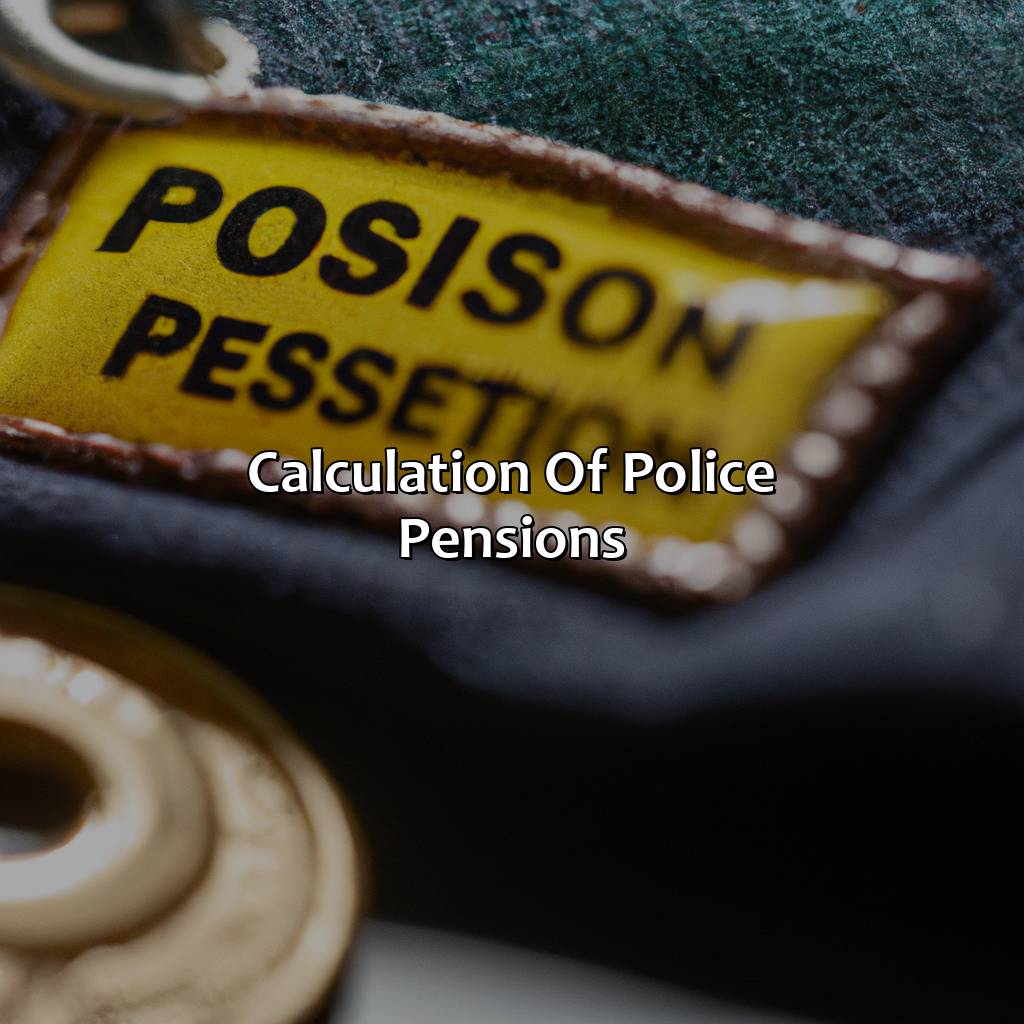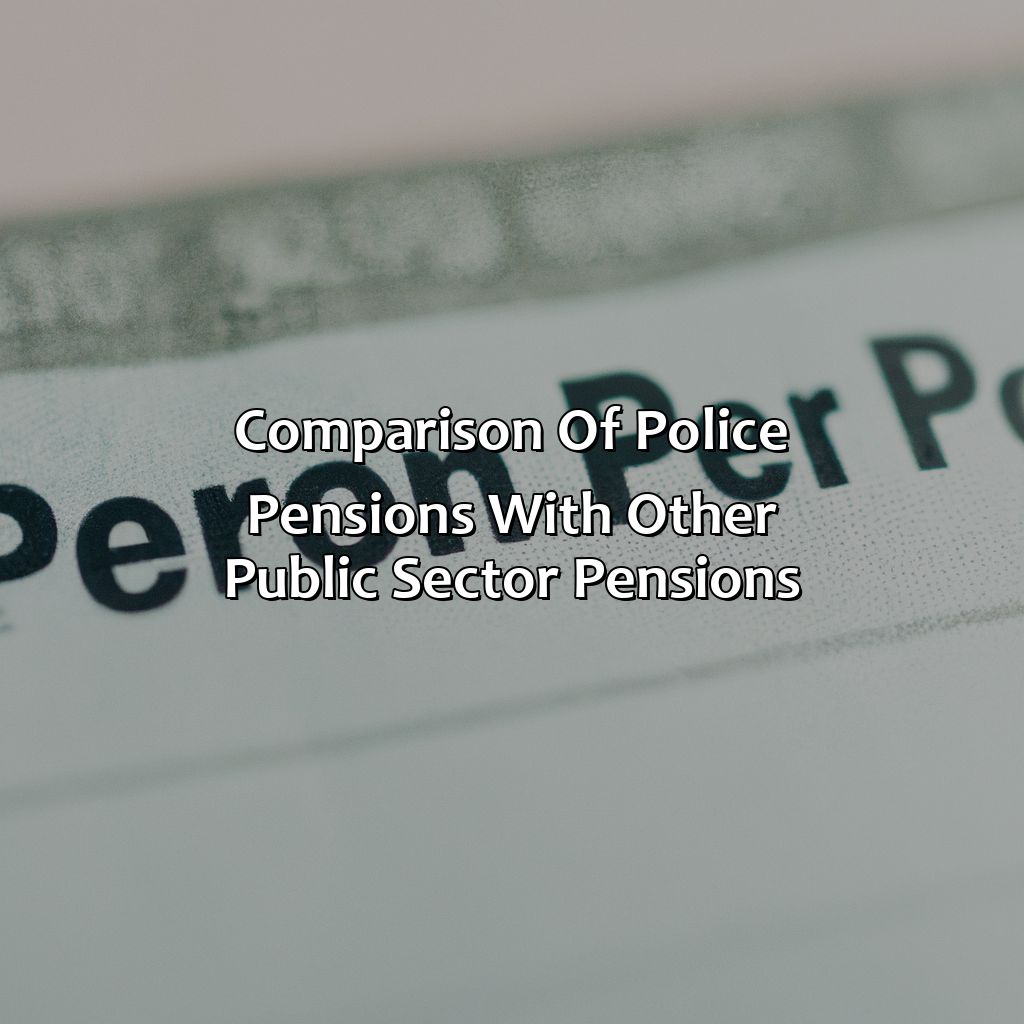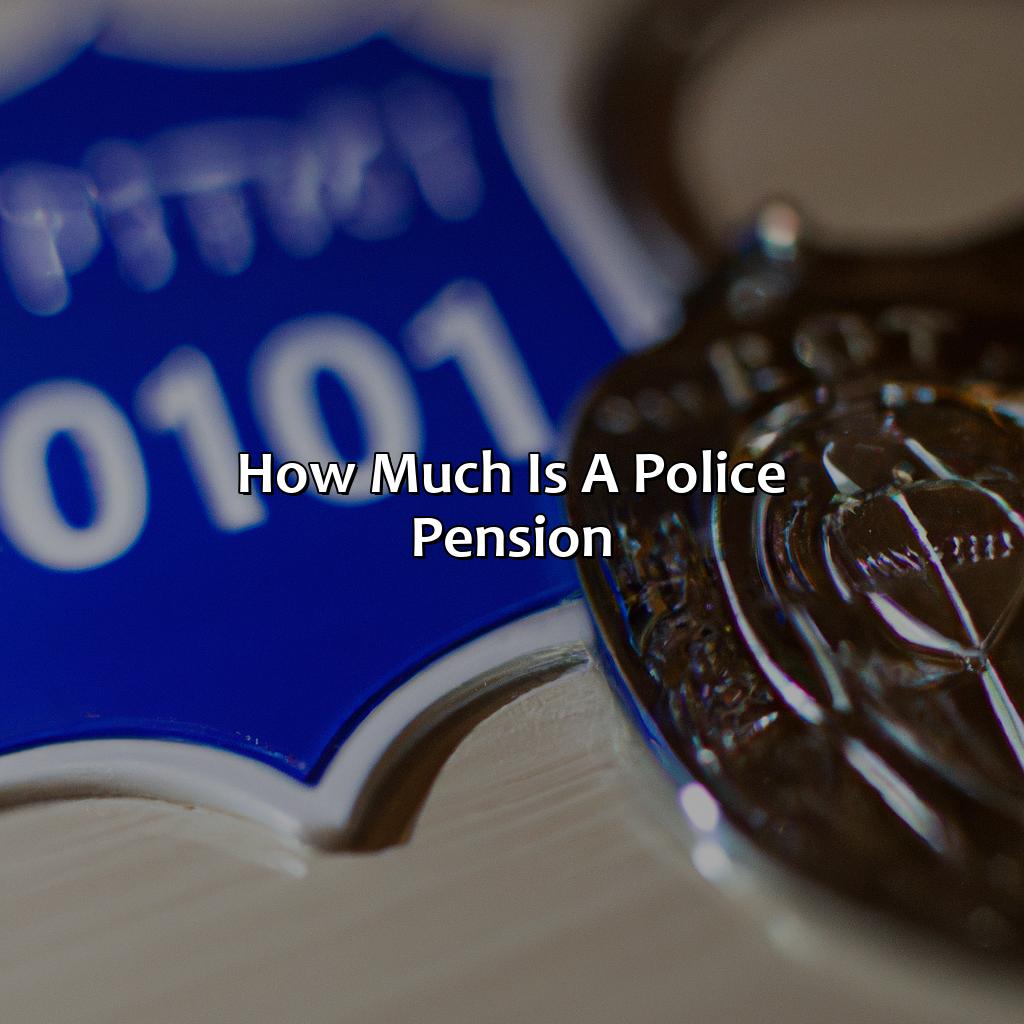How Much Is A Police Pension?
Key Takeaway:
- Police pensions are a retirement benefit for police personnel that provide financial security after years of service. The amount of a police pension is determined by various factors, such as rank, years of service, and eligibility criteria.
- The pension structure for police personnel is divided into two types: Defined Benefit and Money Purchase. Defined Benefit plans typically provide a pension based on a percentage of the employee s salary at the time of retirement, while Money Purchase plans involve contributions from both the employer and the employee, which are then invested for future pensions.
- The factors affecting the amount of a police pension include rank, years of service, salary, and contributions made. The formula for calculating a police pension varies by state and jurisdiction and may involve both a multiplier and a cap on the maximum pension amount.
Does the thought of retirement fill you with anxiety, or questions about the security of your future? We’ll help you by breaking down the details of a police pension so you can make informed plans for your future. With this article, you’ll understand how much of a police pension you could receive.
Pension Structure for Police Personnel
Grasping the pension plan for police officers? Learn the types of pensions and the requirements for being eligible. We’ll take a look at both these topics quickly.

Image credits: retiregenz.com by Adam Arnold
Types of Police Pensions
Police Pension Plans – A Comprehensive Guide
For police personnel, there are different types of pension plans. These pensions vary based on numerous factors such as length of service, the rank of the officer, age at retirement, etc., and can have a significant impact on their overall financial security in retirement.
The following table provides a brief overview of the different types of Pension plans, their description, and benefits:
| Type of Pension Plan | Description | Benefits |
|---|---|---|
| Defined Benefit Plan | Guaranteed payout determined by specific formula based on years of service/most recent salary | Lifetime income stream that adjusts for inflation |
| Defined Contribution Plan | Employee and/or employer contributions into account with investment earnings | Distributions based on balance at retirement |
| Hybrid Pension Plan | Combination of defined benefit and defined contribution plans | Offers some level of guaranteed income while providing additional savings potential |
It is essential to note that some states have significantly underfunded pension systems, and localities may cut benefits or require higher contributions from employees to make up the shortfall. Additionally, some officers may be eligible for Social Security benefits based on their work history outside law enforcement.
Proper understanding and planning for your retirement benefits as a police officer is crucial in ensuring your financial well-being after years of serving and protecting your community. Don’t let ignorance lead to missed opportunities and regret – take charge today. Learn about how much pension credit you could receive per week and plan accordingly.
Eligibility for a police pension is stricter than a VIP event guest list, but at least you don’t have to worry about having a bad outfit.
Criteria for Eligibility
To qualify for a police pension, eligibility criteria depend on rank, years of service, and age. Police officers may be eligible to retire after completing at least 20 years of qualified service or after attaining the age of 50 years. The pension amount is calculated based on average earnings and length of service.
In terms of rank, higher-ranking individuals may receive a larger pension compared to lower-ranking individuals due to the nature of their work and level of responsibility. In addition, disability pensions are available to eligible police personnel who incur disabilities while performing their duties.
It’s worth noting that specific requirements for qualifying for a police pension differ from state to state, but generally, the above criteria must be met. To ensure that you don’t miss out on any potential pension benefits, it’s essential to understand your state’s eligibility criteria and make sure that you meet them. You can also check out the average return on pension funds in UK to get a better idea about your retirement fund.
Don’t let the fear of missing out affect your retirement plans – take action now by familiarizing yourself with your state’s specific pension structure policy and determining your eligibility requirements as a police officer. It can give you peace of mind knowing that you’re taking active steps towards securing future financial stability in retirement. Check out how much you need to pay for your pension to ensure a comfortable future.
Looks like being a cop pays off in the end, thanks to the pension structure – now if only catching criminals was as easy as calculating their retirement funds.
Calculation of Police Pensions
To get the right police pension, you must consider many details. In this section, ‘Calculation of Police Pensions’, we look at what you need to know. Two subsections give help: ‘Factors Affecting Pension Amount’ and ‘Formula for Pension Calculation’.

Image credits: retiregenz.com by David Jones
Factors Affecting Pension Amount
The estimation of an officer’s pension is influenced by several factors. Here’s what you need to know:
- Career Length: The amount of time spent working as a police officer plays a significant role in determining the pension amount.
- Salary: An officer’s salary is also taken into account when calculating their pension.
- Retirement Age: The age at which an individual retires can affect the final amount of the pension.
It is essential to recognize that other criteria, such as disability status and vested rights, may also have an impact on an officer’s pensions.
Pro Tip: Keep track of your employment records, including any promotions or transfers, to ensure the accuracy of your final pension benefit calculation. When planning for retirement, it’s important to know when you can claim pension credit in the UK to ensure you are financially prepared for your golden years.
Get ready for some math that will make your head spin faster than a police car chasing down a suspect.
Formula for Pension Calculation
To determine how much a police pension is, knowing the Formula for Pension Calculation is crucial. The pension amount depends on several factors, including the length of service and salary at retirement. For a better understanding, here’s a table with the accurate Formula for Pension Calculation. It includes columns such as Years of Service, Salary at Retirement, and Pension Percentage.
| Years of Service | Salary at Retirement | Pension Percentage |
|---|---|---|
| 20 | $60,000 | 50% |
| 25 | $70,000 | 62.5% |
| 30 | $80,000 | 75% |
It’s essential to note that this table represents an estimate and pensions can vary by department or state. Apart from years of service and salary at retirement, other factors can impact the calculation of police pensions. These include post-retirement adjustments and survivor benefits. Ensure you understand your department’s retirement plan to make informed choices regarding your pension amount. Don’t leave your financial future to chance. Learn more about pension calculations today to enjoy peace of mind throughout your retirement years. Looks like becoming a police officer might be the closest thing to finding a pot of gold at the end of a retirement rainbow.
Comparison of Police Pensions with Other Public Sector Pensions
To comprehend the comparison between police and other public sector pensions, explore the key disparities. This permits you to make a wise fiscal decision for your future retirement.

Image credits: retiregenz.com by Harry Arnold
Key Differences
For those curious about how much a police pension is compared to other public sector pensions, there are several key differences that set it apart. When looking at salary and retirement benefits together, police pensions are typically more generous than most other public sector pensions.
Below is a breakdown of some of the key differences between a police pension and other public sector pensions:
| Category | Police Pension | Other Public Sector Pensions |
|---|---|---|
| Contribution Rates | Higher rates on salary with matched contributions from employer. | The contribution rate varies by scheme, but often lower via matched contributions from employer as well. |
| Vesting Period | Faster vesting period compared to others | The duration of a vesting period is subject to variation based on the scheme and employer involved. |
It’s also worth noting that certain public sectors such as teaching or civil service may have a different calculation method for their pension compared to police. Additionally, the age of retirement differs from sector to sector.
If you’re interested in joining the police force, keep in mind that while salaries tend to be competitive among public sectors, long-term security through generous retirement benefits will come along with it. Don’t miss out on the stability that comes with your future in law enforcement.
Why bother watching cop shows when you can just read about their pensions being questioned?
Frequently Asked Questions about Police Pensions
Do you have questions about police pensions? We’ve got the answers! Our FAQ guide titled “How Much is a Police Pension?” will guide you through everything you need to know. We’ll discuss the average pension, if it varies by rank, and if it can be transferred. Get ready to learn!

Image credits: retiregenz.com by David Duncun
How Much is a Police Pension?
When it comes to police pensions, individuals are often curious about the details, including how much they can expect to receive. The amount of a police pension varies based on factors such as years of service and rank held. Generally, a police pension is calculated as a percentage of the individual’s final salary at retirement.
Additionally, there are different types of police pensions available, varying by state or police department. In some cases, officers may have the option to choose between a defined benefit pension plan or a defined contribution pension plan. Factors such as investment returns and inflation rates can also impact the eventual payout amount. If you’re wondering about the basic pension rate, it would be best to consult with your state or department’s policies.
It’s important to note that while police pensions can provide financial security for retired officers and their families, they are not always guaranteed. Economic conditions or changes in legislation could affect the availability and amount of future payouts. It’s crucial for officers to stay informed and plan accordingly for their retirement.
For example, Officer Smith retired after 30 years on the force with a final salary of $80,000 per year. Due to his rank and years of service, he was eligible for a police pension equaling 60% of his final salary – resulting in an annual payout of $48,000. However, as economic conditions changed over time, the actual value and sustainability of his pension would fluctuate.
Looks like retirement just got a lot more arresting with the average police pension.
What is the Average Police Pension?
On average, a police pension can vary based on several factors such as years of service, rank, and retirement age. However, based on recent studies, the average police pension is around 60-70% of their final salary. This percentage may increase if officers work for more years or retire at an older age.
It’s essential to note that this percentage may fluctuate depending on the state or municipality in which an officer works. Some areas may have higher or lower pension benefits depending on their budget and retirement policies. Additionally, officers should consult with their financial advisors to make informed decisions regarding their pensions. If you are wondering how much does pension advice cost, it’s best to consult with a professional.
As pension benefits can significantly impact an officer’s future financial stability, it’s vital they take necessary measures to ensure sufficient preparation for retirement. It would be wise to regularly check with local government websites for changes in pension legislation and take advantage of opportunities like tax-deferred compensation plans.
Don’t let the fear of missing out hinder your future! Police pensions play a crucial role in ensuring a secure retirement. Take proactive steps towards researching and planning for your UK pension today.
Whether you’re a rookie or a chief, the pension plan for police is a rank and file system.
Do Police Pensions Vary by Rank?
Police pensions are usually linked to their rank and years of service. The amount of pension officers receive depends on several factors, such as their tenure, salary level, and contributions made towards pension schemes throughout their career.
In addition to this, different police departments may also offer varied pension plans or packages that could affect the total amount an officer can take home after retirement. It’s important for officers to understand these nuances beforehand and plan accordingly.
Considering the different variations in pension systems across departments and regions, it is advisable for officers to seek advice from professional financial planners or legal advisors who specialize in retirement planning well before they reach retirement age.
These experts can provide personalized guidance related to investments, tax implications, and other aspects related to ensuring a comfortable retirement post-career in law enforcement. By engaging these professionals early on in their careers, police officers can mitigate pension-related risks and better prepare themselves for life beyond active-duty service. Wondering how much you can earn while on pension credit? Check out our website for more information.
Sorry, but you can’t transfer your police pension to your next career as a bank robber.
Can Police Pensions be Transferred?
Police pensions are usually structured in a way that they cannot be transferred to another pension scheme. Once you start contributing to the police pension scheme, you will have to remain within the same pension scheme until retirement.
However, there are alternatives to transfer your funds out of the police pension scheme. You may apply for a transfer payment to move your funds out of the police pension scheme to another qualifying registered scheme. This option allows you to retain your benefits as well as transferring them between different guaranteed pension credits.
It is important to bear in mind that transferring your funds outside of the police pension scheme is not always the best option. Therefore, Before transferring, it’s recommended that you seek advice from a financial advisor and fully understand the risks and benefits involved with such transfers.
Five Facts About Police Pensions:
- ✅ The amount of a police pension varies depending on the jurisdiction and years of service. (Source: PoliceOne)
- ✅ In some areas, police pensions can be as high as 80% of their final average salary. (Source: Investopedia)
- ✅ Police officers often contribute a percentage of their salary to their pension fund. (Source: The Balance)
- ✅ Police pensions are designed to provide income during retirement and may include benefits such as health care coverage. (Source: Pension Rights Center)
- ✅ Police pensions have come under scrutiny in recent years due to funding concerns with some cities and states facing budget deficits. (Source: CNBC)
FAQs about How Much Is A Police Pension?
How much is a police pension?
Police pensions vary depending on a number of factors such as years of service, rank, and annual salary. As a general rule, police officers can expect to receive around 50% of their final salary as a pension.
What is the average police pension?
The average police pension is around $60,000 per year. This can vary depending on the factors mentioned above, but $60,000 is a good estimate for a typical police officer’s pension.
How is a police pension calculated?
A police pension is typically calculated based on a formula that takes into account the officer’s years of service, their final salary, and a percentage rate. For example, a typical formula may be 2.5% of the officer’s final salary for each year of service.
Can a police officer retire after 20 years?
Yes, many police officers are eligible to retire after 20 years of service. However, the amount of their pension will be impacted by retiring early. Officers who retire early will typically receive a lower pension than those who continue to work until they are eligible for full retirement.
Can police officers collect Social Security and a pension?
Yes, police officers are eligible to collect both Social Security and a pension. However, their Social Security benefits may be reduced due to their pension income. This is known as the Windfall Elimination Provision (WEP).
How does a police pension affect taxes?
A police pension is considered taxable income, which means that it will be subject to federal and state income taxes. However, many states offer tax breaks or exemptions for pension income, so it’s important to check the tax laws in your state.
